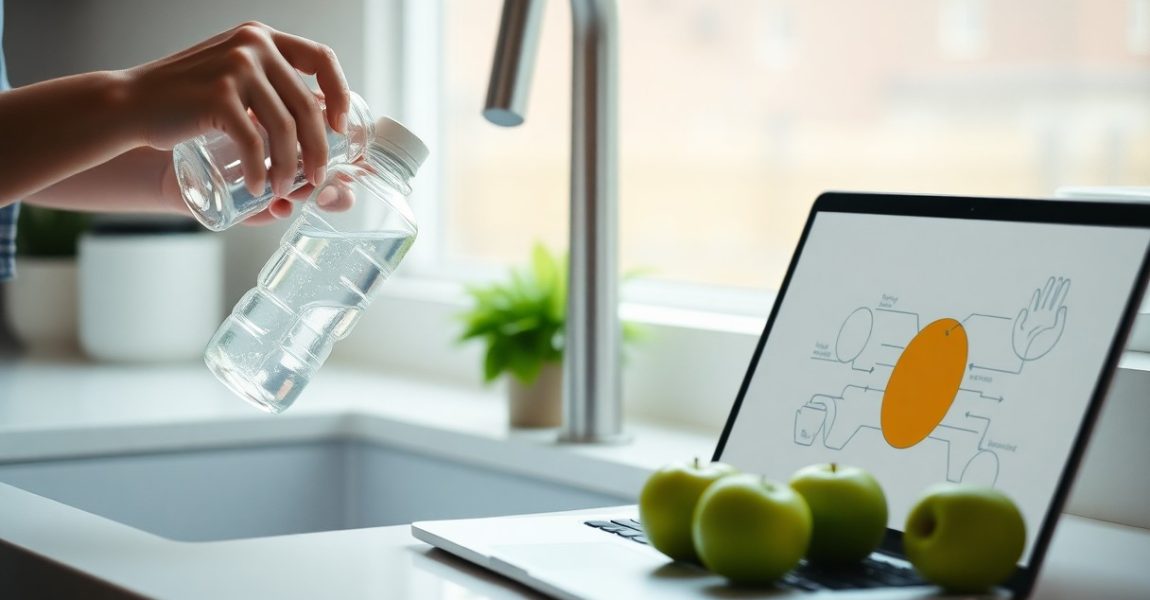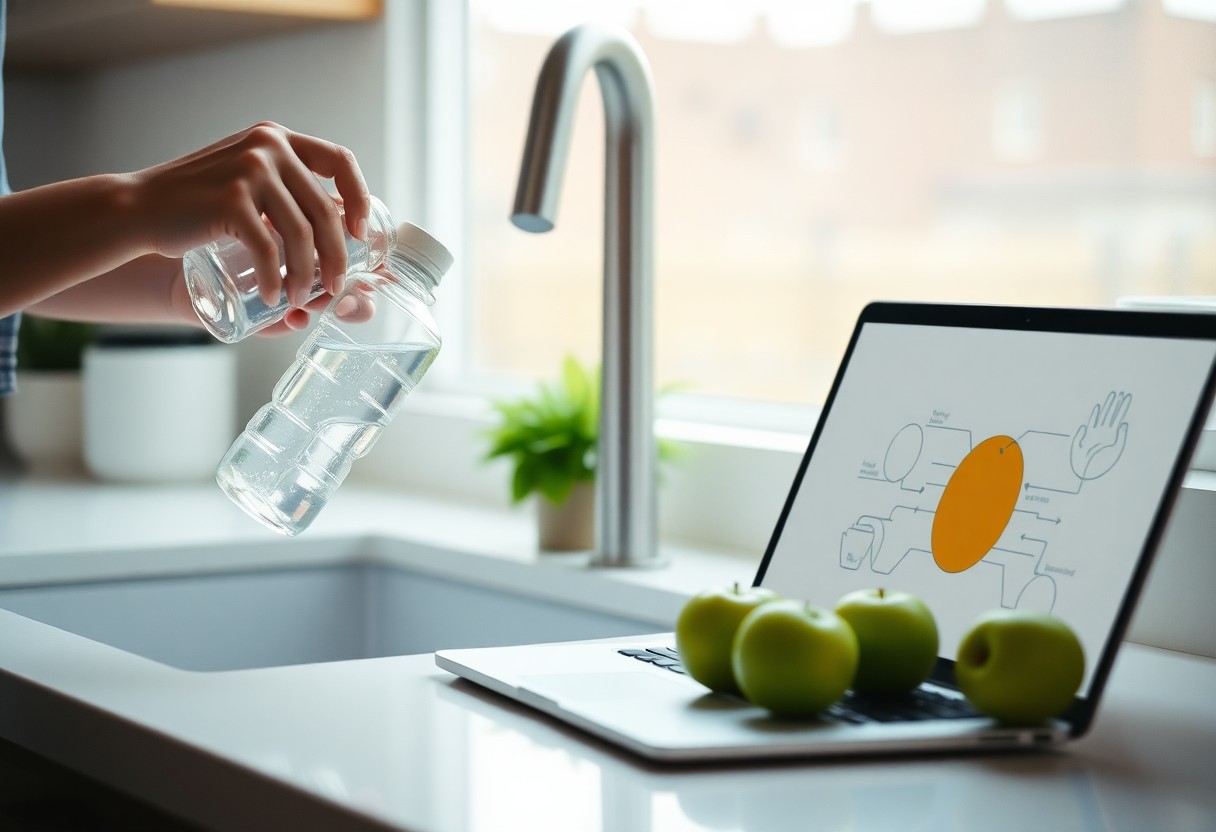
Mood plays a vital role in your overall well-being, and often, a simple solution is just a sip away. You might be surprised to learn that staying properly hydrated can significantly enhance your mental clarity and contribute to a more positive outlook. In this listicle, we’ll explore 10 surprising ways drinking water can transform how you think and feel, ensuring you’re at your best every day. Dive into these tips to elevate your mood and sharpen your mind with one of the most necessary resources your body needs. Elevate your mood and sharpen your focus naturally with refreshing alkaline water — the smarter way to stay hydrated for mental clarity and emotional balance
Contents
- 1 Hydration’s Role in Cognitive Function
- 2 The Uplifting Power of Proper Hydration
- 3 Enhanced Focus and Concentration
- 4 Water’s Influence on Sleep Quality
- 5 Creative Thinking Boosted by H2O
- 6 Summing up
- 7 FAQ
- 7.0.1 Q: How can drinking water actually improve my mood?
- 7.0.2 Q: What role does hydration play in mental clarity?
- 7.0.3 Q: Can drinking water really reduce stress levels?
- 7.0.4 Q: Is there a connection between hydration and energy levels?
- 7.0.5 Q: How much water should I be drinking for mood enhancement?
Key Takeaways:
- Staying hydrated can significantly enhance cognitive function, leading to improved focus and attention.
- Drinking water can help reduce feelings of stress and anxiety, promoting a calmer mindset.
- Proper hydration aids in the regulation of mood, potentially reducing irritability and enhancing emotional stability.
- Even mild dehydration can negatively affect mental performance and mood, underscoring the importance of regular water intake.
- Increased water consumption can lead to better sleep quality, which directly contributes to mental clarity and overall well-being.

Hydration’s Role in Cognitive Function
Staying hydrated is crucial for maintaining optimal cognitive function. You may not realize it, but every single cell in your body, including those in your brain, relies on water to function properly. When you ensure that you drink enough fluids throughout the day, you’re equipping your brain with the necessary resources to perform at its best. Water plays a significant role in regulating neurotransmitters, the chemicals that transmit signals in the brain, which influences your mood, focus, and mental clarity. Stay positive and focused all day with our 5-gallon alkaline water — the perfect boost for mood and mental clarity, delivered straight to your home or office.
Additionally, hydration promotes blood circulation, allowing for better oxygen and nutrient delivery to your brain cells. This enhances your cognitive abilities while also helping to diminish feelings of fatigue and listlessness. When you are adequately hydrated, you also experience fewer headaches and increased alertness, both of which are vital for effective problem-solving and decision-making in your daily life.
How Water Affects Brain Physiology
Your brain is about 75% water, making it imperative to maintain sufficient hydration levels for the brain to function effectively. When you drink water, it helps to maintain the brain’s electrical activity, which is critical for processing information efficiently. When you are well-hydrated, your capacity for attention and memory improves, allowing you to retain and process information more effectively. Without enough water, synaptic transmission can slow down, leading to a drop in cognitive function, which may leave you feeling mentally sluggish or unfocused.
Furthermore, hydration assists in the production of brain-boosting hormones and enzymes that support various bodily functions. A well-hydrated brain enhances creativity and overall mental flexibility, enabling you to think more clearly and adaptively. This connection between hydration and cognitive performance emphasizes how simply drinking enough water can make you feel more engaged and energized throughout the day.
The Connection Between Dehydration and Mental Performance
Even mild dehydration can lead to significant impacts on your mental performance. You might notice that when you’re not drinking enough water, you can become forgetful, easily frustrated, or even anxious. Research indicates that losing just 1-2% of your body’s water weight can impair cognitive abilities, including attention, memory, and even mood regulation. This is because dehydration affects neurotransmitter function, which is crucial for effective communication between brain cells.
Moreover, studies have shown that individuals who are dehydrated often report feeling tired and lethargic, which can hinder your focus and overall productivity. If you want to maintain sharp mental clarity and a positive emotional outlook, staying sufficiently hydrated is crucial. So, make it a habit to regularly drink water throughout the day and observe how it positively influences your cognitive performance and mood. Taking these small yet effective steps towards hydration can lead to a noticeable enhancement in how you think and feel on a daily basis.
The Uplifting Power of Proper Hydration
When you think of ways to improve your mood and cognitive function, your first instinct might not be to reach for a glass of water. However, proper hydration plays a significant role in your emotional and mental health. Your brain is mostly made up of water, and maintaining optimal hydration is important for its various functions. When you are dehydrated, you may find it harder to think clearly, and your emotional state may suffer; feeling sluggish, irritable, or even anxious. By making it a habit to drink enough water throughout your day, you can support a more positive mindset and enhance your mental clarity.
Understanding the connection between hydration and your well-being highlights how something as simple as drinking water can have profound effects on your daily life. As you sip throughout the day, you are actively contributing to not just your physical health but also your mental resilience. The simple act of hydrating can become a powerful tool in your self-care routine, promoting a more stable mood and sharper focus.
Water as a Natural Mood Stabilizer
Water serves as a natural mood stabilizer because adequate hydration supports neurotransmitter function in your brain. Neurotransmitters, such as serotonin and dopamine, play pivotal roles in regulating your mood. When you are dehydrated, the production of these chemicals can be hindered, leading to feelings of sadness or irritability. By ensuring that you are drinking enough water, you help keep these neurotransmitters balanced, which promotes a more stable and uplifting mood.
Furthermore, hydration also influences the way you handle everyday stress. When you are well-hydrated, your body can more effectively manage stress hormones, leading to a more relaxed and centered state of mind. Drinking water is an immediate way to enhance your mood while providing a sense of revitalization. So every time you fill your glass, you are not just quenching your thirst but also nurturing a positive emotional state.
Impact on Stress Levels and Anxiety
The relationship between water intake and stress levels may surprise you, as dehydration can significantly amplify feelings of anxiety. When your body lacks sufficient fluids, it may lead to the production of stress hormones like cortisol, which heightens anxiety and stress responses. This can create a vicious cycle, as heightened anxiety may lead you to neglect proper hydration, thus worsening your mental state. By prioritizing hydration, you take a proactive step towards reducing these stress responses and promoting a calming effect on your mind.
From simple daily headaches to more severe feelings of discomfort, being dehydrated can condition you to perceive situations as more stressful than they are. Making an effort to stay hydrated can improve your resilience against stress and anxiety. Keep a water bottle handy to effortlessly incorporate hydration into your daily ritual. This simple habit can assist in managing these feelings, leaving you feeling more balanced and in control of your emotions.
Enhanced Focus and Concentration
In the matter of achieving peak mental performance, proper hydration plays a vital role in enhancing your focus and concentration. As your brain is composed of approximately 75% water, maintaining optimal hydration levels is crucial for its functionality. You might notice that when you’re even mildly dehydrated, your ability to concentrate and process information can significantly decline. By drinking sufficient water, you can help ensure that your cognitive functions remain sharp, allowing you to tackle tasks with greater efficiency and clarity.
The Science of Water and Productivity
Research indicates that water intake has a direct impact on cognitive performance. Studies have shown that people who are adequately hydrated are better at tasks requiring attention, memory, and problem-solving skills. When you drink enough water, you facilitate improved blood flow to the brain, which can heighten your alertness and mental agility. This potential boost in productivity can be particularly helpful during long workdays or challenging projects, where maintaining focus is paramount for success.
Real-Life Examples of Improved Focus Through Hydration
Many individuals have noticed substantial improvements in their focus simply by prioritizing hydration. For instance, professionals who routinely keep a water bottle at their desk have reported enhanced work performance and increased levels of creativity. Similarly, students preparing for exams have found that drinking water throughout their study sessions helps them retain information better and improves their test-taking abilities. These anecdotes highlight the practical benefits of staying hydrated in various settings—be it a bustling office or a quiet library.
In addition to personal testimonies, workplace initiatives promoting hydration have shown that companies offering accessible drinking water facilities see improved employee productivity and morale. By simply encouraging consistent water breaks, many individuals have found that their mental clarity and focus improve dramatically throughout the day, allowing them to engage more effectively in their tasks. Such real-life applications underscore the crucial relationship between hydration and cognitive prowess, illustrating just how powerful water can be in optimizing your focus.
Water’s Influence on Sleep Quality
Quality sleep plays a vital role in your overall mood and cognitive function. Dehydration can significantly disrupt your sleep patterns, making it harder for you to achieve the restorative sleep that your body and mind need. When you don’t drink enough water throughout the day, you might experience increased levels of stress and anxiety, which can lead to insomnia or frequent waking during the night. As a result, your capacity to focus and your emotional well-being may suffer, leaving you feeling groggy and irritable in the morning.
The Sleep-Mood Connection
Your mood and sleep are interconnected in ways that may surprise you. When you wake up feeling refreshed due to a good night’s sleep, you are more likely to approach your day with energy and positivity. On the other hand, when dehydration interferes with your ability to get restful sleep, you may find yourself in a cycle of negativity, struggling to maintain your emotional balance. The quality of your sleep can directly influence your emotional resilience, making it necessary to consider not only the amount you sleep but also how well-hydrated you are before bedtime.
Hydration Habits for Better Rest
To enhance your sleep quality, it’s beneficial to develop hydration habits that align with your bedtime routine. Aim to drink sufficient water throughout the day to avoid feeling thirsty before you sleep. However, try to limit your fluid intake in the hour or two before bed to prevent nocturnal trips to the bathroom that could disturb your slumber. You might also consider incorporating foods with high water content, such as fruits and vegetables, into your meals, as they help to keep you hydrated without overloading your bladder right before bedtime.
Establishing a consistent pattern of hydration can greatly affect your nightly rest. Incorporating herbal teas, which are mostly water yet caffeine-free, into your evening routine can be particularly soothing. Additionally, assessing your hydration needs based on physical activity and environmental factors can help you fine-tune your water intake. Ensuring that your body is properly hydrated will not only lead to better sleep quality but can also boost your mood and mental clarity, setting you up for success each morning.
Creative Thinking Boosted by H2O
Water is more than just a fundamental component for bodily functions; it plays a significant role in enhancing your creativity. When you are adequately hydrated, your brain functions optimally, paving the way for innovative thoughts and ideas to flow. Dehydration can lead to decreased cognitive performance, which could inhibit your ability to brainstorm and generate creative solutions. By simply ensuring that you drink enough water, you can sharpen your focus and expansive thinking, making it easier to tackle challenges with a fresh perspective.
Exploring the Link Between Creativity and Hydration
Studies suggest a strong connection between hydration levels and cognitive flexibility, both crucial components of the creative process. When your brain is in a hydrated state, your ability to make novel connections and see patterns improves significantly. This means that your idea generation can become more rich and diverse when you keep your body replenished with adequate amounts of H2O. On the flip side, being even slightly dehydrated can result in a downturn in mood, which can stifle your imagination and problem-solving skills, leaving you to struggle for inspiration.
Practical Tips for Staying Hydrated During Brainstorming Sessions
To maximize your creative sessions, it’s crucial to incorporate hydration into your brainstorming routine. Start your brainstorming by filling a large glass or pitcher with water, making it easily accessible while you work. Consider using a water bottle that you can keep at your desk, reminding you to sip regularly. Snack on fruits and vegetables with high water content, such as cucumbers or watermelon, to supplement your hydration while you brainstorm. Pausing every so often to take a few sips can also serve as a mental refresh, paving the way for your creative thoughts to flow more freely. The
- Keep water accessible at your workspace.
- Opt for hydrating snacks like water-rich fruits.
- Take regular hydration breaks to refresh your mind.
- Track your intake to ensure you meet hydration goals.
Staying hydrated doesn’t have to be a tedious task; instead, make it an integral part of your creative methodology. Set a timer or reminder every 30 minutes to check in on your water intake, or pair drinking with your brainstorming milestones—such as after every completed idea. You might even consider infusing your water with lemon or mint for a refreshing twist that encourages you to drink more frequently. The
- Set hydration reminders for focused drinking.
- Infuse water with flavor to boost taste.
- Pair drinking with milestones during brainstorming.
- Engage in a fun hydration challenge with teammates.
Summing up
To wrap up, incorporating adequate hydration into your daily routine can significantly enhance your mood and mental clarity. By understanding the surprising ways that water impacts your mental wellbeing, you can make informed choices that ultimately lead to a more positive outlook and improved cognitive function. As you stay hydrated, you may notice a decrease in feelings of fatigue and irritability, enabling you to tackle daily challenges with a fresh perspective and renewed energy.
Additionally, making a conscious effort to drink water regularly can have profound long-term benefits for your overall mental health. From amplifying your concentration to reducing anxiety, the influences of hydration are both subtle and powerful. By prioritizing water intake in your life, you’re not just nourishing your body; you’re also equipping your mind to thrive. So, take those simple steps to drink more water, and watch how it transforms your mood and sharpens your mental clarity.
FAQ
Q: How can drinking water actually improve my mood?
A: Staying hydrated can lead to better overall brain function. Water affects neurotransmitter production, the brain’s chemicals that influence mood. Dehydration can lead to feelings of anxiety and depression, while adequate hydration promotes emotional balance and a more positive outlook on life.
Q: What role does hydration play in mental clarity?
A: Water is vital for optimal cognitive function. Dehydration can impair attention, memory, and the ability to think clearly. By drinking enough water, you enhance the brain’s ability to process information and make decisions, leading to improved mental clarity.
Q: Can drinking water really reduce stress levels?
A: Yes! Dehydration can increase cortisol, the hormone associated with stress. By ensuring that you drink enough water throughout the day, you can help maintain lower cortisol levels, reducing feelings of stress and promoting a calming effect on the mind.
Q: Is there a connection between hydration and energy levels?
A: Absolutely! Even mild dehydration can lead to fatigue and sluggishness. When you drink water, it helps maintain optimal physiological function, which includes regulating energy levels. Staying properly hydrated provides the vitality needed for daily activities and boosts mood as a result.
Q: How much water should I be drinking for mood enhancement?
A: While the amount of water needed varies by individual, a good rule of thumb is to aim for about 8 cups (64 ounces) a day. Factors such as activity level, climate, and overall health can influence your hydration needs. Listening to your body and drinking when you’re thirsty is a great place to start for maintaining balance and enhancing mood.
- August 18, 2025
- Benefits
